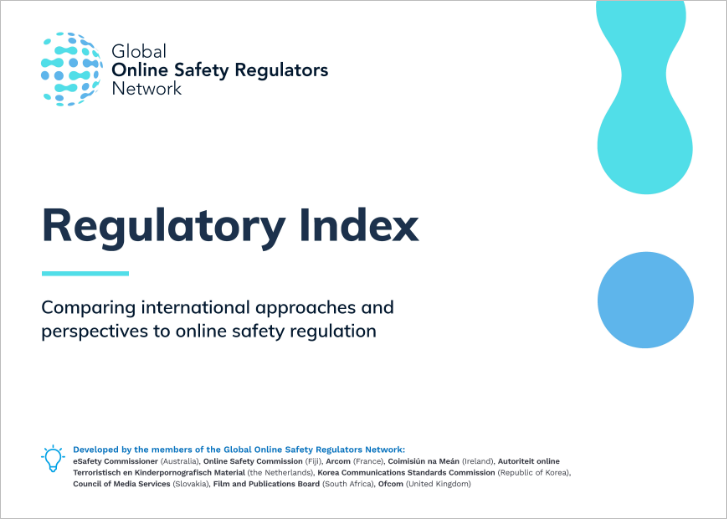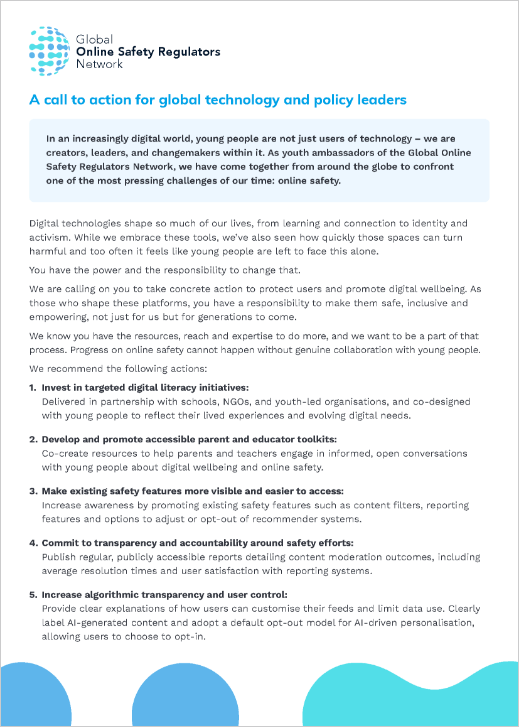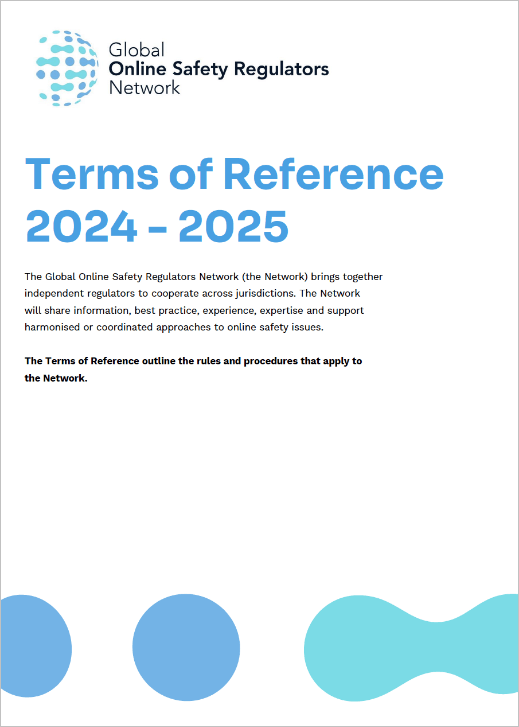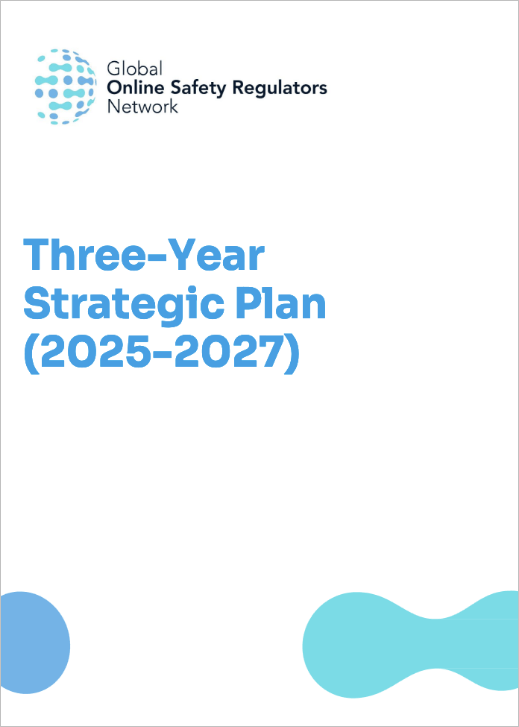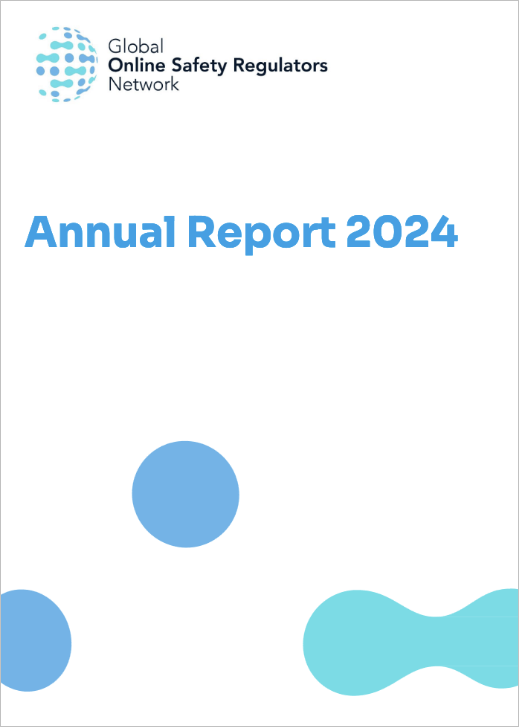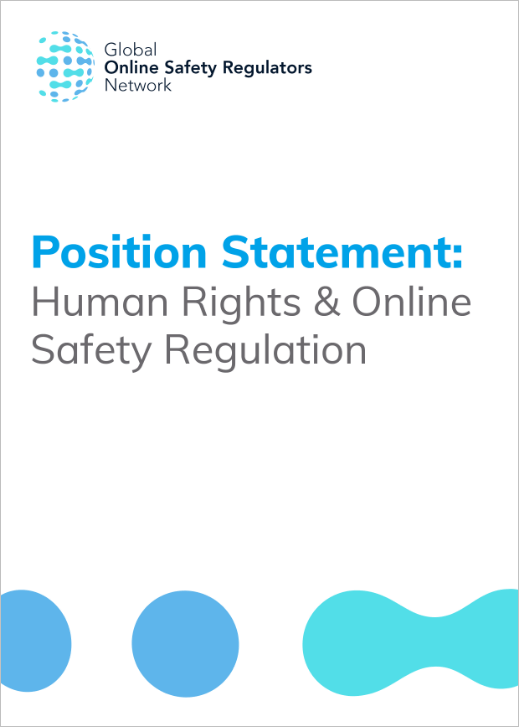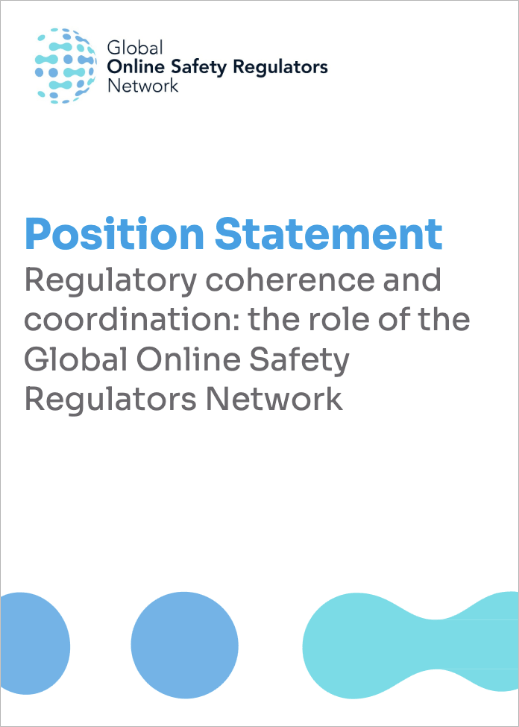The Global Online Safety Regulators Network
The Global Online Safety Regulators Network is the only global forum dedicated to supporting collaboration between online safety regulators, sending a strong message about our shared commitment to online safety regulation.
Through this, we encourage wider international membership and cooperation, with the aim of making the approach to online safety between countries is as consistent and coherent as possible.
On this page:
What the Network does
The Global Online Safety Regulators Network brings together independent regulators to cooperate across jurisdictions. We do this by sharing information, best practice, expertise, and experience, to support coherent and coordinated approaches to online safety issues.
The rules and procedures of the Network are set out in the Terms of Reference.
The Network has established working groups to promote collaboration and pursue strategic priorities. This year, there are working groups on: Risk Assessments and the Supervision of Platforms.
The Network also participates in a range of international events and forums to engage with global audiences and promote online safety, and is an observer to the Global Privacy Assembly.
Online Safety Regulatory Index
The Online Safety Regulatory Index collates Network members' approaches to online safety regulation.
The Index is designed to support comparison of online safety regulatory frameworks, collaboration between regulators and regulatory coherence. By understanding the areas of consistency and divergence in regulations, regulators can aim to ensure that the online safety of internet users in our respective countries does not stop ‘at the border’ and that companies can benefit from economies of scale.
Use the Index to better understand the online safety regulatory environment of member countries.
Special project: Youth Dialogues 2025
In April and May 2025, the Global Online Safety Regulators Network brought together 19 youth ambassadors, aged 18 to 24, from nine countries around the world in a special project, the Youth Dialogues.
Participants shared their culture and heritage, insights from their experience as youth advocates, and explored the common challenges young people face globally in digital environments.
'Being part of the Youth Dialogues... reminded me that our voices matter — and together, we can shape the future of the digital world for the better.'
Megan (New Zealand)
Through exchanges with representatives from 5Rights, the Family Online Safety Institute and the Integrity Institute, the group identified practical actions that global technology companies and policy makers can take to support young people to have safer, more informed online experiences.
Their discussions culminated in a call-to-action letter, urging global technology companies and policy makers to invest in digital literacy education and user empowerment tools, and to meaningfully engage with youth people through co-design.
[The Youth Dialogues] 'was impactful, I learnt so much about Online Safety and I'm ready to advocate for the safety of children in the digital space.'
Favour (Nigeria)
Read the letter to see how young people are advocating for a safer online world.
Membership
Membership of the Global Online Safety Regulators Network is open to regulators with legislated online safety functions, who meet criteria on independence from political and commercial interference, and are committed to upholding human rights, democracy and the rule of law.
Current members include:
- eSafety Commissioner – Australia
- Arcom – France
- Autoriteit online Terroristisch en Kinderpornografisch Material (ATKM) – the Netherlands
- Coimisiún na Meán – Ireland (Vice Chair)
- Council for Media Services – Slovakia
- Film and Publication Board – South Africa
- Korea Communications Standards Commission – Republic of Korea
- Office of Communications (Ofcom) – United Kingdom (Chair)
- Online Safety Commission – Fiji
The Network also wants to engage those who are looking to establish online safety regulation or are eager to learn from the shared experiences of this group of like-minded regulators. The Network might give observer status to different groups as the Network progresses and regulatory frameworks develop.
Observers will be organisations and stakeholders working on online safety issues and committed to working collaboratively with independent online safety regulators. This can include civil society, policymakers, multilateral organisations, and industry groups.
Current observers include:
- 5Rights
- Childlight – Global Child Safety Institute
- Department of Canadian Heritage – Canada
- European Parliament Intergroup on Children's Rights
- Family Online Safety Institute – Global
- Freiwillige Selbstkontrolle Multimedia-Diensteanbieter e.V. (FSM) – Germany
- INHOPE
- Integrity Institute
- Internet Watch Foundation
- National Communications Commission (Taiwan)
- National Centre for Missing and Exploited Children (NCMEC)
- National Media Commission (Ghana)
- Netsafe – New Zealand
- NYU Stern Center for Business and Human Rights
- Red Papaz
- Te Mana Whakaatu | Classification Office – New Zealand
- The Canadian Centre for Child Protection – Canada
- WeProtect Global Alliance
If you would like more information, or to receive a member or observer application form, please email current chair of the Network – Ofcom: Ofcom.International@ofcom.org.uk
Governance documents – The Global Online Safety Regulators Network
Position statements
As part of its global leadership in online safety, the Network drafts position statements on online safety issues with input and collaboration from all members.
Position statements focus on online safety issues and aim to deliver the objective of establishing a respected, clear and influential collective voice of independent online safety regulators
Position Statement on human rights and online safety
This statement articulates the Network’s shared commitment to championing a human rights-based approach to online safety regulation and harm prevention.
Position Statement on regulatory coherence and coordination
This statement articulates the Network’s approach to regulatory coherence and coordination, including setting out our activities for pursuing coordination, the benefits of regulatory coherence, and the opportunity costs of not doing so.
Last updated: 13/11/2025
